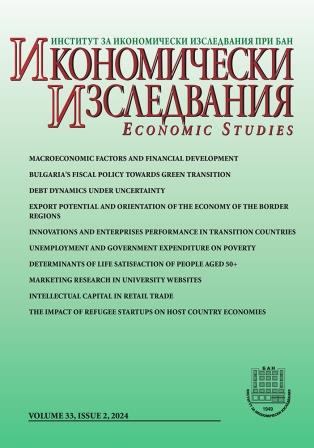Nexus between Macroeconomic Factors and Financial Development: Empirical Evidence from Transition Countries
Nexus between Macroeconomic Factors and Financial Development: Empirical Evidence from Transition Countries
Author(s): Fisnik Morina, Duresa Kilaj, Sadri AlijaSubject(s): Economy, National Economy
Published by: Институт за икономически изследвания при Българска академия на науките
Keywords: financial development; economic growth; broad money; deposits; loans
Summary/Abstract: The main purpose of this study is to analyze how different macroeconomic factors have influenced the financial development of countries in transition as well as the effect of these factors on the volatility of the banking sector in these countries. Secondary data acquired and processed from yearly statistics reports of the World Bank, the International Monetary Fund, the OECD, the European Central Bank, Eurostat, and others were used to develop this research. In the analytical section of the literature review, numerous scientific papers by various authors that have examined the issue of financial development in the economies of various countries have been reviewed. This research covers data from 2005 to 2020, which will be examined using panel and time series econometric models.Based on the study's econometric findings, we can conclude that non-performing loans, natural resources, market liberalization, GDP per capita, inflation, and interest rates have a statistically significant impact on the financial development of transition countries by determining the amount of broad money and the volume of bank loans and deposits in these countries' financial systems. The empirical findings of this study will serve as good scientific and empirical evidence for future studies in the field of financial development and economic growth, as well as practical evidence for governments around the world in the form of strategic macroeconomic policies that will positively affect the financial development of countries in transition. In relation to essential conclusions, this research offers true and consistent findings. The studied period (2005-2020) offers a compelling time frame for making sound findings and recommendations.
Journal: Икономически изследвания
- Issue Year: 2024
- Issue No: 2
- Page Range: 3-26
- Page Count: 24
- Language: English

